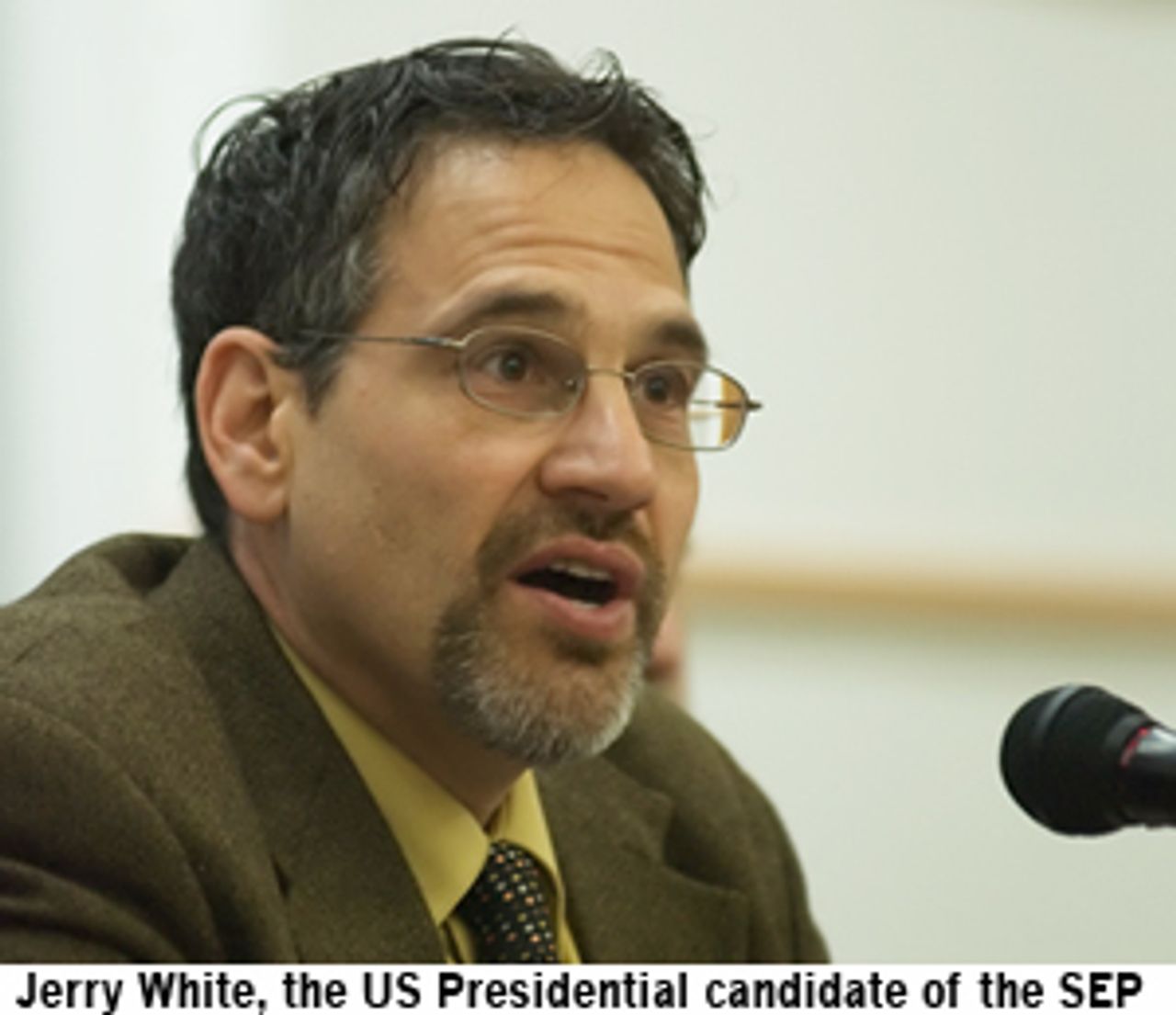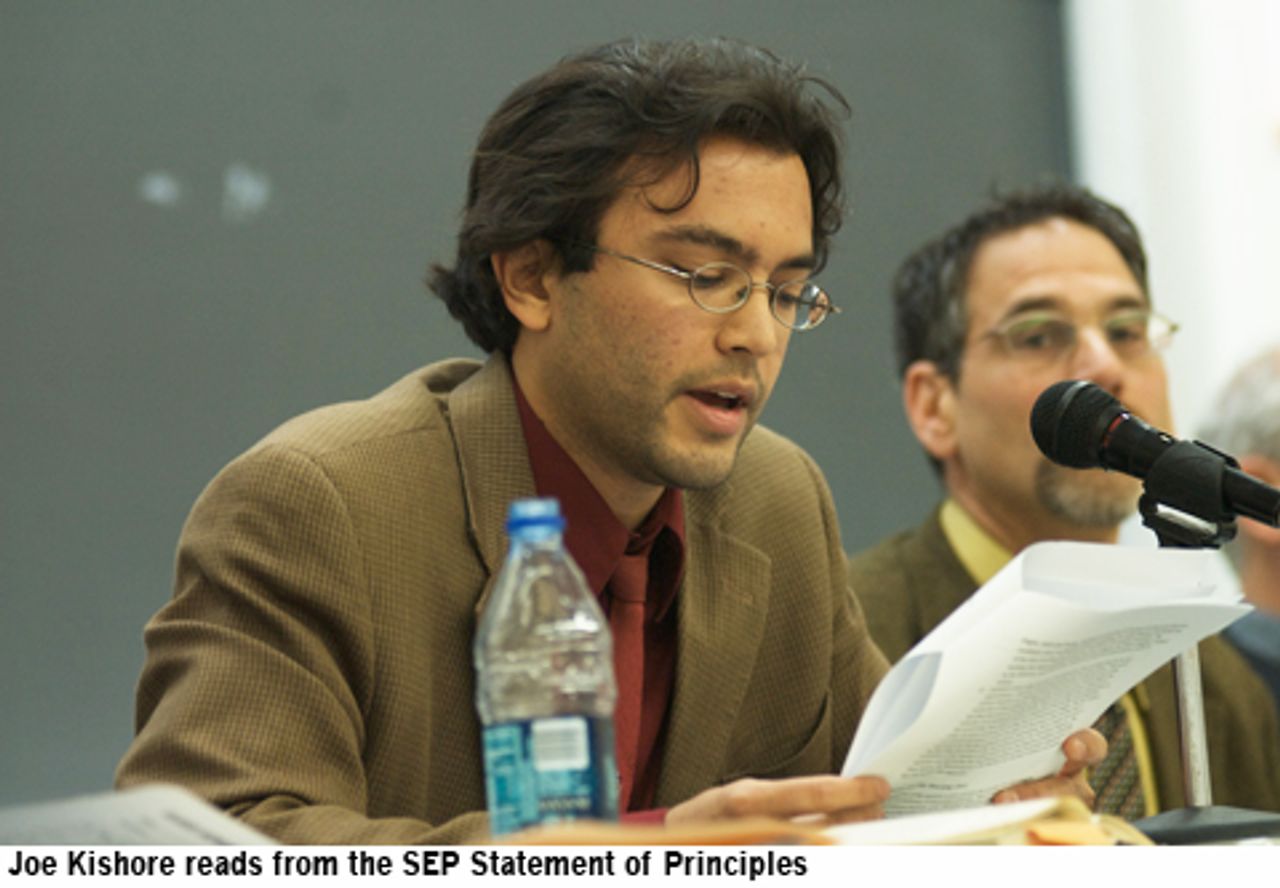To commemorate the 70th anniversary of the founding of the Fourth International, the Socialist Equality Party held a meeting at the University of Michigan in Ann Arbor on Saturday, November 1.
The title of the meeting was "Socialism and the Future of Humanity." Speakers included David North, SEP national chairman and chairman of the World Socialist Web Site international editorial board; Joe Kishore, SEP national secretary; Jerry White, the SEP's presidential candidate; and Andre Damon, from the US steering committee of the International Students for Social Equality.
North spoke on the historical origins of the Fourth International and the political perspective of the Socialist Equality Party. His full report can be found here.
At the end of the afternoon, the group watched the newly remastered version of the great documentary film of the Russian Revolution, Tsar to Lenin, directed by Herman Axelbank.
 A central theme of the meeting was that the unfolding crisis of world capitalism, centered in the United States, would provoke social upheavals around the world and create conditions for the growth of the socialist movement. This movement, speakers stressed, had to be based on the experiences of the 20th century and on a defense of the traditions of Trotskyism and Marxism.
A central theme of the meeting was that the unfolding crisis of world capitalism, centered in the United States, would provoke social upheavals around the world and create conditions for the growth of the socialist movement. This movement, speakers stressed, had to be based on the experiences of the 20th century and on a defense of the traditions of Trotskyism and Marxism.
In his opening remarks, presidential candidate White reviewed the unfolding collapse of the world financial system, the government bailout of major financial institutions, the desperate conditions that now threaten the working class, and the response of leading government spokesmen of both the Democrats and Republicans.
Democratic candidate Barack Obama has made clear his support for the interests of Wall Street by pushing for the bailout of banks and other financial institutions, White said. In both foreign and domestic policy, Obama completely defends the interests of American capitalism and the American ruling class. As the Obama campaign seeks to lower popular expectations for his potential presidency, White explained that the implications of the unfolding global crisis "will provoke huge social upheavals."
White pointed to the recent SEP Founding Congress and said that the burning need for the working class was to build its own party, based on the struggle for the history and principles of Marxism. "This is the purpose of our campaign and all of our work after the election," he concluded, calling on supporters to join the Socialist Equality Party.
Andre Damon, representing the Steering Committee of the ISSE, spoke of the revolutionary implications of the current economic crisis and the necessity of educating a new generation in Marxist theory. "Three generations have passed since the world wars and the Great Depression," he said, but the world is entering a similar period today. The working class in the 21st century will have to solve the great historical problems left unresolved in the 20th century.
There was keen interest in the reports. A number of comments and questions on a wide range of issues followed and opened up a lively discussion.
One student asked speakers to explain on what basis the SEP could assert that it represents the interests of the working class. In response, North and Kishore stressed that a party must be judged on the basis of its history, record and political program. They urged the questioner to carefully study the history of the party and make an evaluation on this basis.
Kishore concluded the meeting by stressing, "The economic crisis is not of a temporary, accidental character, but is quite fundamental to the structure of American and world capitalism. It will have a transformational impact on the consciousness of millions of people."
 "We proceed from that fundamental understanding that in the development of a socialist movement it is not necessary for us to create social discontent, to create social opposition, to create mass struggles," Kishore said. "These struggles will develop out of the objective situation. What is above all necessary for a political party is the fight for a perspective, the fight for an understanding of the nature of the objective situation and the tasks that the working class faces.
"We proceed from that fundamental understanding that in the development of a socialist movement it is not necessary for us to create social discontent, to create social opposition, to create mass struggles," Kishore said. "These struggles will develop out of the objective situation. What is above all necessary for a political party is the fight for a perspective, the fight for an understanding of the nature of the objective situation and the tasks that the working class faces.
Kishore also stressed the significance of the SEP Founding Congress, which adopted two documents—the SEP Statement of Principles and The Historical and International Foundations of the Socialist Equality Party—that lay out the historical and programmatic foundations of the party.
The WSWS interviewed some of those in attendance.
Chen, a student from China who recently enrolled at the University of Michigan, said, "There is a huge amount of official propaganda on socialism in China. But we don't learn about Trotsky in China. Around the world there are many different opinions and tendencies. I wanted to hear other voices and other opinions about socialism."
"Students here and back home want to improve China," he said, "but we learn almost nothing about socialist movements abroad." Asked if he thought the Chinese regime could be characterized as socialist, Chen laughed. "They call themselves socialist. A better term would be bureaucratic capitalist."
Rod, a worker from Raleigh-Durham, North Carolina, said he made the long trip specifically in order to attend the meeting. He said he had been a daily reader of the World Socialist Web Site for more than five years and that he had decided to travel to attend the meeting because in recent days he felt a "pressing need to be connected with other socialists who share my views."
"I'm finding more and more people who are receptive to the idea of socialism. On the surface my life is great," he continued. "But I don't have control over my future. If I were to lose my job, I could be out in the street."
Alaa, a student at the University of Michigan, had attended a meeting of the ISSE on campus and had received an email about Saturday's meeting. She said the discussion was very interesting. "I was thinking that the working class was somehow separate from me, in a factory or something," she said. "I never before thought of myself as being part of working class."
Gary, a retired physician from Northern Wisconsin, flew into Michigan for the meeting. "I've been reading the WSWS for years," he said, "and wanted to put faces to the names of these writers."
Gary said that in his youth he had participated in protest politics. "Those kinds of piecemeal and patchwork practices just don't work," he said. Interested in history, Gary said that the Socialist Equality Party's integrated theoretical and historical approach was "incisive and honest. You just don't find that kind of theoretical and historical integrity anywhere else in the modern media."
David North visited Trotsky’s final residence during his exile (1929-33) on the island of Prinkipo, and paid tribute to the life of the great theorist of world socialist revolution.
